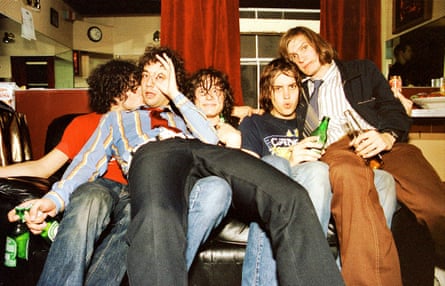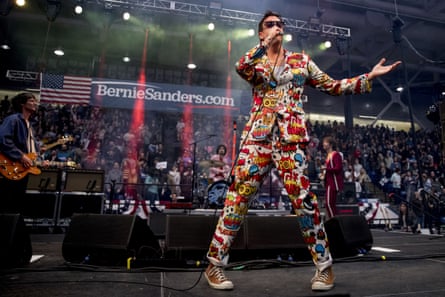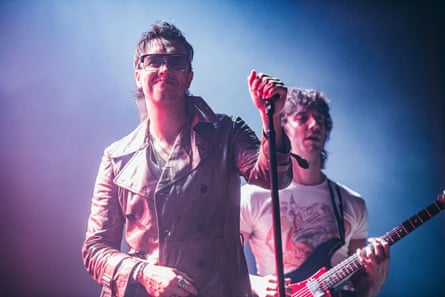Julian Casablancas and Albert Hammond Jr are sitting at opposite ends of an overstuffed sofa in an upmarket London hotel, some weeks before the coronavirus crisis reached the UK. They look, as the Strokes have always looked, like rock stars of an exceptionally cool variety: cool enough, certainly, to pull off what look suspiciously like mullet haircuts. Hammond’s is a little longer at the back than most people would countenance, while Casablancas has gone for the full-on shaved-at-the-sides, strands-of-hair-curling-around-the-shoulders look.
Other than the hair, they look almost eerily unchanged from the way they did almost 20 years ago, when the Strokes emerged from the indie clubs of Lower East Side in Manhattan and blazed a brief, dramatically successful trail through Britain, singlehandedly upending the UK’s post-Britpop alt-rock doldrums, precipitating a burst of musical activity that would give the world the Libertines, the White Stripes, the Killers, Kings of Leon, Franz Ferdinand, Interpol, Yeah Yeah Yeahs and Arctic Monkeys. “I just wanted to be one of the Strokes,” sang the latter’s frontman, Alex Turner, on their 2018 album Tranquility Base Hotel & Casino.
Speaking as someone who looks nothing like they did 20 years ago, the ravages of time having very much taken their toll, it is hard not to regard Hammond in particular – who, at nearly 40, is trim and exceptionally handsome in a tight-fitting pair of tailored trousers, a shirt buttoned up to the neck and a pair of Dr Martens brogues – and wonder at the absolute bloody unfairness of it. After all, one of us spent a significant proportion of the intervening years in a state of terrifying dissolution – alternately injecting himself with cocktails of ketamine and cocaine and heroin and cocaine, by his own admission coming “close to death” – and it was not me.

Those days of dissolution are a long way behind them. Hammond finally cleaned up after an intervention in 2009; a few years before, Casablancas had conquered the alcoholism that left him, in his former manager’s words, “a drunken nightmare to society as a whole” and made interviewing him the kind of event that journalists discussed among themselves in hushed, horrified tones. If you want to know how bad an interview with Casablancas could get, read the US writer Neil Strauss’s collection Everyone Loves You When You’re Dead, in which the singer somehow contrives to emerge as by far the most wayward and difficult figure in a book that also features Jerry Lee Lewis, Ike Turner, Mötley Crüe and sundry unnamed members of the Calabrian mafia.
In fact, these seem to be rather good times for the Strokes, whose fortunes since the release of their multiplatinum 2001 debut Is This It have been mixed. They say they struggled to take in their initial success: never as famous in the US as they were elsewhere – “When we got home, it was still all about Christina Aguilera or whatever,” says Hammond – they don’t seem to have fully grasped how big they were. “It was like, we’re going to do Reading festival and we don’t even really know what a festival is. And then you’re getting moved to a bigger stage and we didn’t know what that meant either: ‘I don’t even give a shit! Who is Reading anyway?’” He says he didn’t even know what the NME was. “Not to say I took it for granted – it was exciting. But it was happening in England, we were signed to a small label, it didn’t feel real.”
September 11 happened fewer than two months after Is This It came out and “kind of distracted everything”, Hammond says. “Success was just like this weird, vague, slow thing. Our second album, it was like: ‘If we don’t put something out quick enough, then this’ll be over.’ Then our second album didn’t do as good as the first and the third album didn’t do as good as the second, so there was never a feeling of: we fucking made it! Roll credits! It was always this kind of half-anxious, half-exciting ‘What the hell is happening?’”

Still, it was better than what happened next, which Casablancas describes – with what turns out to be characteristic delicacy– as “some grey areas on control and on quality, fuelled with the traditional, less exciting and more cliched elements of a rock band’s success – grossness”.
“Those cliches,” nods Hammond. “So funny.”
“But true, though,” says Casablancas, quietly.
There were also, by all accounts, terrible intra-band conflicts, perhaps exacerbated by the fact that Casablancas had written the Strokes’ first three albums almost in their entirety (the other band members got one co-writing credit each). “I think wanting to be in charge and wanting something to be good are different things,” he frowns. “One is about selfishness, the other is about something objective. Is this person just an egomaniac wanting control or is it someone who can actually make it better? And that’s just life.”
A low point was reached with 2011’s Angles, a laboured album that sounded as if it was made by a band who did not want to record it at all, which, reading between the lines of what Casablancas says, is not that far from the truth. They declined to tour or promote the release of its successor, Comedown Machine, at all, “because we weren’t in harmony”, he says.
“You know, maybe in a few years it really won’t matter and I’ll just say it … I could explain it, it’s not a big deal, but …” He tails off, but concedes that they felt the “need to not be contractually bound” to a band that was now “limiting to our personal lives. I guess it’s not that controversial, really. There was conflict and there was fear and we got through it and we made records, but it wasn’t, you know, out of pure brotherly love and musical inspiration.”
Like a lot of people, I had assumed they had split up after a 2016 EP, Future Present Past, quietly slipped out on Casablancas’s own label, Cult. By then, Casablancas was given to comparing the Strokes unfavourably to his work with the Voidz, a weirder and more eclectic outfit; Hammond seemed content releasing solo albums; the guitarist Nick Valensi was busying himself with a heavy metal-ish project called CRX; the bassist, Nikolai Fraiture, formed Summer Moon with the drummer from Jane’s Addiction; and the drummer, Fabrizio Moretti, was working on visual art. But here they are, promoting the release of a sixth album, The New Abnormal, produced by Rick Rubin, no less: “I guess he thought: these guys have fallen far enough,” smiles Casablancas.
It is the best thing they have done in years, a subtle, smart updating of their original melding of the Velvet Underground, various New York new wave bands, the Cars and Tom Petty, with noticeably more politicised lyrics than previous Strokes albums, unless you count their views on New York City cops. “I’ve always been interested in politics,” says Casablancas, “but I can trace the moment I was like: ‘I have to read books and see what’s happening,’ to the second George W Bush victory: ‘What, we re-elected this dude?’ That was so baffling to me that I went deep into politics. It’s been the same thing since Nixon, with people getting less aware and less caring.”

The state of the US aside, the making of The New Abnormal has apparently left its authors in a hugely positive state, creating “the possibility of something even better later”, says Hammond. “What we could do next excites me more than I have been excited in, I don’t know, our whole career.”
Their reputation has also been burnished by the passing of time. Lizzie Goldman’s 2017 book Meet Me in the Bathroom was ostensibly about “Rebirth and Rock and Roll in New York City 2001-2011”, but it hinged on the story of the Strokes, turning them into a mythic entity. Critically acclaimed, it is about to be turned into a film.
The Strokes’ recent benefit gig at a Bernie Sanders rally was riotously successful: audience members climbed on stage, then the police walked on to try to clear them off, which led to the improbable sight of Julian Casablancas singing New York City Cops – “they ain’t too smart” – while an actual New York City cop stood next to him, attempting to attract his attention.
A couple of days before I meet Casablancas and Hammond, the band play a one-off London show: it is sold out, the queue to get in already snaking down the street hours before they are due to play. On stage, they look in remarkably high spirits, eschewing a performance of their debut single, The Modern Age, in favour of making up a song in the middle of their set. “Julian likes to jam,” sighs Hammond, “so he goes up to the guy in the band that does it least and tells me to do it. Kind of like Spinal Tap, where they do their free-jazz odyssey.”
Nevertheless, there are moments when the atmosphere during our interview feels a little strained. Nothing like in the old days, when Casablancas was wont to unexpectedly leap on journalists and kiss them or tell them to fuck off and walk out, but there is no mistaking the slightly agonising way he picks his words, as if he is worried about upsetting someone. A routine inquiry about Rubin’s fabled calm, Buddha-like presence in the studio leads to a deathly silence, punctuated by a series of sighs, and eventually the words: “It’s Rick Rubin, so … I don’t want to like, you know …” before his voice trails off entirely. “Interviews are interesting,” he finally decides, “because it’s not about honesty, really.”
What do you mean? Are you concerned about being misrepresented? “Sure, that’s part of it. On a selfish, personal level, interviews are the opposite of therapy. It’s like unhealthy self-reflection. And it’s just years of people in your life being: ‘I was really upset about what I read in that thing,’ and I’m just like: what?! It’s very easy to get stuff out of context when it becomes the quote.”
And then he brightens, proclaiming the Guardian “really cool” and me “super-nice”. He talks about the band members’ non-musical activities: Hammond has dabbled in fashion, while Casablancas, more surprisingly, has designed a folding, pedal-free electric bike, a most un-Strokes-like form of transport about which he is nevertheless enthused. “Electric bikes seem like the future of communal travel to me.” He looks at Hammond. “He rides motorcycles and I think that’s cool, but the truth is that everyone falls off and hurts themselves. If you ride an electric bike and fall off, it’s like running fast; it’s how our bodies are designed.
“I just thought it was interesting making something,” he continues. “It’s expensive and time-consuming and the business world is fascinating, because you see the mechanisms of the decision-making process that has led to art, quality and truth being circumvented for, you know, financial ease and sheep-like following of trends.
“Even with putting out a record, you know, since the day the Strokes got signed, it was this wrestling match between doing cool creative things and smart marketing things. It’s a dance, and I respect the dance, but that’s why right now pop music is king over art and quality, because it’s all been scientifically worked out. That’s why cars are ugly, because if someone makes a cool car, they’ll make slightly less money. ‘But think of all the inspiration you’ll cause in the world!’ ‘No, you’re fired!’”
Then he stops talking and exhales. “Anyway,” he says.
The New Abnormal is released on 10 April on Cult and RCA Records

Comments (…)
Sign in or create your Guardian account to join the discussion